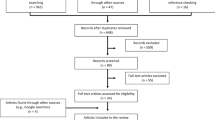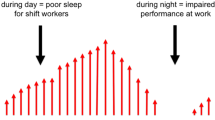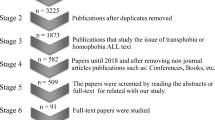Abstract
Purpose
There is limited empirical evidence regarding mental health in workplace settings in Africa. Gold mining is a major industry in Ghana, and this study investigated mental health-related symptoms and the factors contributing to such symptoms among employees in the Ghanaian.
Methods
A cross-sectional survey design study was used to collect data from employees working in the mining industry across five gold mines in Ghana. All mining employees were invited to participate in the survey. Sociodemographic and work characteristic data (including job content) was collected alongside measures of recent mental health-related symptoms (Kessler-10). Questionnaires were administered in English. Data were analysed using descriptive statistics and logistic regression models.
Results
Of 1165 participants (response rate: 78%), 87% were male and 13% were female. The majority of the participants were in the 25–34 age category. Psychological distress was categorized as low (62.6%), moderate (24.3%), high (10.0%) and very high (3.2%). Shift type (working 12 h or more), physical working conditions and financial factors were significantly associated with psychological distress. Job resources and job demands was not significantly associated with levels of psychological distress.
Conclusion
This is the first study to explore mental health in the Ghanaian gold mining industry. The findings identify workplace factors associated with psychological distress in the mining industry in Ghana and support the importance of promoting mental health as part of workplace health and safety strategy to improve mental health across the mining population.
Similar content being viewed by others
Data availability
For researchers who meet the criteria for access to confidential data, the data are available through the University of Newcastle Human research ethics committee giving the reference number (Approval number H-2018-0194). Requests for data access may be sent to human-ethics@newcastle.edu.au.
References
Ackermann M, Botha D, Van Der Waldt G (2018) Potential socio-economic consequences of mine closure. J Transdiscipl Res South Afr 14:1–11
Adeeku F (2015) Perception and attitude towards mental illness: a case of the Pantang Community University of Ghana. [Master's thesis, University of Ghana]. http://ugspace.ug.edu.gh/bitstream/handle/123456789/8336/Adeeku%20Florence_%20Perceotions%20and%20Attitudes%20Towards%20Mental%20Illness%20%3B%20The%20Case%20of%20Pantang%20Community%20_2015.pdf?sequence=1&isAllowed=y
Agyemang CB, Nyanyofio JG, Gyamfi GD (2014) Job stress, sector of work, and shift-work pattern as correlates of worker health and safety: a study of a manufacturing company in Ghana. Int J Bus Manag 9(7):59–69. https://doi.org/10.5539/ijbm.v9n7p59
Amponsah-Tawiah K, Dartey-Baah K (2011) The mining industry in Ghana: a blessing or a curse. Int J Bus Soc Sci 2(12):62–69
Amponsah-Tawiah K, Jain A, Leka S, Hollis D, Cox T (2013) Examining psychosocial and physical hazards in the Ghanaian mining industry and their implications for employees’ safety experience. J Safety Res 45:75–84
Amponsah-Tawiah K, Leka S, Jain A, Hollis D, Cox T (2014) The impact of physical and psychosocial risks on employee well-being and quality of life: the case of the mining industry in Ghana. Saf Sci 65:28–35
Annor F (2016) Work–family demands and support: examining direct and moderating influences on work–family conflict. J Workplace Behav Health 31:87–103. https://doi.org/10.1080/15555240.2015.1119656
Ansah EW, Mintah JK, Ogah JK (2018) Psychosocial safety climate predicts health and safety status of Ghanaian fuel attendants Universal. J Public Health 6:63–72. https://doi.org/10.13189/ujph.2018.060205
Battams S, Roche AM, Fischer JA, Lee NK, Cameron J, Kostadinov V (2014) Workplace risk factors for anxiety and depression in male-dominated industries: a systematic review. Health Psychol 2:983–1008. https://doi.org/10.1080/21642850.2014.954579
Boateng R (2019) Menzgold: when fraud meets ‘Ghanamanic gullibility’ et al. Ghana. https://www.graphic.com.gh/features/opinion/ghana-news-menzgold-when-fraud-meets-ghanamanic-gullibility-et-al.html
Canada Occupational Health and Safety Regulations (2009) Canada. https://laws.justice.gc.ca/PDF/SOR-86-304.pdf
Considine R et al (2017) The contribution of individual, social and work characteristics to employee mental health in a coal mining industry population. PLoS ONE 12:e0168445
De Menil V, Osei A, Douptcheva N, Hill AG, Yaro P, Aikins ADG (2012) Symptoms of common mental disorders and their correlates among women in Accra, Ghana: a population based survey Ghana. Med J 46:95–103
Dewe PJ, O’Driscoll MP, Cooper CL (2012) Theories of psychological stress at work. In handbook of occupational health and wellness. Springer, Boston, pp 23–38
Dohrenwend BP, Shrout PE, Egri G, Mendelsohn FS (1980) Nonspecific psychological distress and other dimensions of psychopathology: measures for use in the general population. Arch Gen Psychiatry 37:1229–1236. https://doi.org/10.1001/archpsyc.1980.01780240027003
Driesen K, Jansen NW, Kant I, Mohren DC, van Amelsvoort LG (2010) Depressed mood in the working population: associations with work schedules and working hours. Chronobiol Int 27:1062–1079. https://doi.org/10.3109/07420528.2010.489877
Enu P, Hagan E, Ahouandjinou E, Attah-Obeng P (2014) Relationship between education and wage differentials in Ghana: a case study of Accra-a Suburb of greater Accra Region. Int J Acad Res Bus Soc Sci 4(1):277–294. https://doi.org/10.6007/IJARBSS/v4-i1/528
Ghana Chamber of Mines (2015) Mining in Ghana—what future can we expect?. https://www.icmm.com/website/publications/pdfs/mining-parterships-for-development/mining-in-ghana_what-future-can-we-expect
Ghana Statistical Service (2019) Ghana living standards survey. Ghana statistical service, Ghana. https://www2.statsghana.gov.gh/nada/index.php/catalog/97/study-description
Ghosh AK, Bhattacherjee A, Chau N (2004) Relationships of working conditions and individual characteristics to occupational injuries: a case-control study in coal miners. J Occup Health 46:470–480
Gyekye SA (2003) Causal attributions of Ghanaian industrial workers for accident occurrence: miners and non-miners perspective. J Safety Res 34:533–538
Henry P, Hamilton K, Watson S, MacDonald N (2013) FIFO/DIDO mental health research. Lifeline WA, Perth
Hongxia Y, Xianying W, Jinxia S (2011) Investigation on relationships among social support, life events and psychological health of coal mine workers. Chin Nurs Res 6
Jacobs M, Pienaar J (2017) Stress, coping and safety compliance in a multinational gold mining company. Int J Occup Saf Ergon 23:152–161. https://doi.org/10.1080/10803548.2016.1263476
James C, Rahman M, Bezzina A, Kelly B (2020) Factors associated with patterns of psychological distress, alcohol use and social network among Australian mineworkers. Aust N Z J Public Health 44:390–396
Jr RobertKarasek A (1979) Job demands, job decision latitude, and mental strain: implications for job redesign. Adm Sci Q 24:285–308
Karasek JRA (1979) Job demands, job decision latitude, and mental strain: Implications for job redesign. Adm Sci Q 24:285–308. https://doi.org/10.2307/2392498
Karasek R, Brisson C, Kawakami N, Houtman I, Bongers P, Amick B (1998) The Job Content Questionnaire (JCQ): an instrument for internationally comparative assessments of psychosocial job characteristics. J Occup Health Psychol 3:322–355. https://doi.org/10.1037//1076-8998.3.4.322
Karasek R, Choi B, Ostergren PO, Ferrario M, De Smet P (2007) Testing two methods to create comparable scale scores between the Job Content Questionnaire (JCQ) and JCQ-like questionnaires in the European JACE Study. Int J Behav Med 14:189–201. https://doi.org/10.1007/BF03002993
Kekesi EK, Agyemang CB (2014) Perceived job insecurity and psychological distress: the moderating role of work values. Int J Manag Econ Soc Sci 3:18–35
Kelly B et al (2015) Working well: mental health in mining—queensland mining industry, Australian Coal Industry’s Research Program (ACARP), Australia
Kessler RC et al (2003) Screening for serious mental illness in the general population. Arch Gen Psychiatry 60:184–189
Kuma JSY (2017) Mining education and the challenges In Ghana’s minerals industry. Paper presented at the Ghana mining and energy summit, Ghana. http://ghanachamberofmines.org/wp-content/uploads/2017/06/Prof-Jerry-Kuma-The-Contribution-of-Mining-Education.pdf
Liu L, Wen F, Xu X, Wang L (2015) Effective resources for improving mental health among Chinese underground coal miners: perceived organizational support and psychological capital. J Occup Health 57:58–68. https://doi.org/10.1539/joh.14-0082-OA
Liu J et al (2019) Subjective perceptions and psychological distress associated with the deep underground: a cross-sectional study in a deep gold mine in China. Medicine (baltimore) 98:e15571. https://doi.org/10.1097/MD.0000000000015571
Lück D, Ruppenthal S (2010) Insights into mobile living: spread, appearances and characteristics, In: Schneider NF, Collet B (Eds) Mobile living across Europe II: causes and consequences of job-related spatial mobility in cross-national comparison. pp 37–68
McLean KN (2012) Mental health and well-being in resident mine workers: out of the fly-in fly-out box. Aust J Rural Health 20:126–130. https://doi.org/10.1111/j.1440-1584.2012.01267.x
Metals ICoM (2015) Mining in Ghana—what future can we expect?. https://www.icmm.com/website/publications/pdfs/mining-parterships-for-development/mining-in-ghana_what-future-can-we-expect
Mfoafo-M’Carthy M, Sossou MA (2017) Stigma, discrimination, and social exclusion of the mentally ill: the case of Ghana. J Human Rights Soc Work 2:128–133
Morrow R, Brough P (2019) ‘It’s off to work we go!’ Person–environment fit and turnover intentions in managerial and administrative mining personnel. Int J Occup Saf Ergon 25:467–475. https://doi.org/10.1080/10803548.2017.1396028
Roche AM, Pidd K, Fischer JA, Lee N, Scarfe A, Kostadinov V (2016) Men, work, and mental health: a systematic review of depression in male-dominated industries and occupations. Saf Health Work 7:268–283
Sipsma H, Ofori-Atta A, Canavan M, Osei-Akoto I, Udry C, Bradley EH (2013) Poor mental health in Ghana: who is at risk? BMC Public Health 13:288
StataCorp LLC (2018) STATA StataCorp. https://www.stata.com/company/contact/
Stewart AG (2020) Mining is bad for health: a voyage of discovery. Environ Geochem Health 42:1153–1165. https://doi.org/10.1007/s10653-019-00367-7
Torquati L, Mielke GI, Brown WJ, Burton NW, Kolbe-Alexander TL (2019) Shift work and poor mental health: a meta-analysis of longitudinal studies. Am J Public Health 109:13–20. https://doi.org/10.2105/AJPH.2019.305278
Virtanen M, Stansfeld SA, Fuhrer R, Ferrie JE, Kivimäki M (2012) Overtime work as a predictor of major depressive episode: a 5-year follow-up of the Whitehall II study. PLoS ONE 7:e30719
Whitehouse D (2019) Ghana now Africa’s largest gold producer, but reforms await. https://www.theafricareport.com/18245/ghana-now-africas-largest-gold-producer-but-reforms-await/#:~:text=It’s%20too%20soon%20for%20Ghana,total%20for%20the%20first%20time. Accessed 8 June 2020
WHO (2011) WHO-AIMS report on mental health system in Ghana. World Health Organization, Geneva
WHO (2019) Mental health in the workplace. https://www.who.int/mental_health/in_the_workplace/en/. Accessed 4 July 2019
Work Health and Safety Act (2011). https://www.legislation.gov.au/Details/C2018C00293
Acknowledgements
The authors gratefully acknowledge the statistical support of CReDITSS during the result analysis.
Author information
Authors and Affiliations
Contributions
WAD is the main author and contributed to all aspects of study design, data acquisition, data analysis and interpretation, and preparation of the manuscript. JR, BJ AND CJ lead study conception and design. KAT provided assistance with data collation. WAD, JR, BK, KAT and CJ provided strategic guidance throughout the project, and assisted with the preparation of manuscript. All authors read and approved the final manuscript.
Corresponding author
Ethics declarations
Conflict of interest
The authors declare no competing or conflicts of interests.
Additional information
Publisher's Note
Springer Nature remains neutral with regard to jurisdictional claims in published maps and institutional affiliations.
Rights and permissions
About this article
Cite this article
Asare-Doku, W., Rich, J.L., Kelly, B. et al. Mental health and mining: the Ghanaian gold mining story. Int Arch Occup Environ Health 94, 1353–1362 (2021). https://doi.org/10.1007/s00420-021-01726-7
Received:
Accepted:
Published:
Issue Date:
DOI: https://doi.org/10.1007/s00420-021-01726-7




